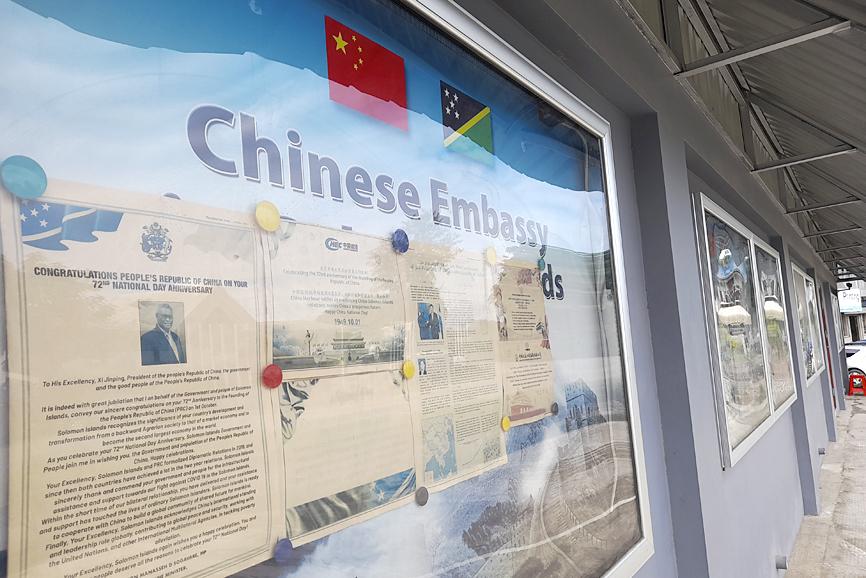The Solomon Islands said on Thursday that it had secured a US$66 million loan from China to fund tech giant Huawei Technologies Co’s (華為) plans to build 161 telecommunications towers across the Pacific nation.
The deal marks the first financing the country of islands has received from Beijing since it signed a secretive security pact in April following the severing of diplomatic links to Taiwan.
The Solomons’ government said the deal was a “historical financial partnership” that comes after it cut ties with Taiwan and restored ties with Beijing in 2019.

Photo: AP
However, the Solomons’ growing financial and security links to China have roused concern from the US and its allies. Western officials said that China could use the security pact to build a military base in the country — something Solomon Islands Prime Minister Manasseh Sogavare has repeatedly denied.
Under the terms of the deal, the Solomons is to receive a 20-year concessional loan from state-linked Export-Import Bank of China that would fully fund Huawei’s construction of the towers, the government said in a statement.
Almost half of the towers would be built before the country hosts the Pacific Island Games in November next year, it said.
The towers would allow islanders, especially those in rural areas, to watch the Games even if they are not able to not travel to the capital, Honiara, it said.
Sogavare this month proposed changing the country’s constitution to delay national elections until after the Games, saying the country could not afford both events.
Sogavare’s comments were called a “lame excuse” by opposition leader Matthew Wale, who said that any delay to the polls would amount to “an abuse of the people’s right to exercise their vote.”
The next election — due to be held before September next year — is to be the country’s first since widespread rioting by anti-Sogavare protests broke out in Honiara last year.
It would also be the first poll since Sogavare signed the security pact with Beijing which — according to a leaked draft — allows Chinese security forces to be called in to quell unrest.
If the push to delay elections is successful, the Solomon Islands would not go to the polls until 2024 at the earliest.

CHAOS: Iranians took to the streets playing celebratory music after reports of Khamenei’s death on Saturday, while mourners also gathered in Tehran yesterday Iranian Supreme Leader Ayatollah Ali Khamenei was killed in a major attack on Iran launched by Israel and the US, throwing the future of the Islamic republic into doubt and raising the risk of regional instability. Iranian state television and the state-run IRNA news agency announced the 86-year-old’s death early yesterday. US President Donald Trump said it gave Iranians their “greatest chance” to “take back” their country. The announcements came after a joint US and Israeli aerial bombardment that targeted Iranian military and governmental sites. Trump said the “heavy and pinpoint bombing” would continue through the week or as long

TRUST: The KMT said it respected the US’ timing and considerations, and hoped it would continue to honor its commitments to helping Taiwan bolster its defenses and deterrence US President Donald Trump is delaying a multibillion-dollar arms sale to Taiwan to ensure his visit to Beijing is successful, a New York Times report said. The weapons sales package has stalled in the US Department of State, the report said, citing US officials it did not identify. The White House has told agencies not to push forward ahead of Trump’s meeting with Chinese President Xi Jinping (習近平), it said. The two last month held a phone call to discuss trade and geopolitical flashpoints ahead of the summit. Xi raised the Taiwan issue and urged the US to handle arms sales to

BIG SPENDERS: Foreign investors bought the most Taiwan equities since 2005, signaling confidence that an AI boom would continue to benefit chipmakers Taiwan Semiconductor Manufacturing Co’s (TSMC, 台積電) market capitalization swelled to US$2 trillion for the first time following a 4.25 percent rally in its American depositary receipts (ADR) overnight, putting the world’s biggest contract chipmaker sixth on the list of the world’s biggest companies by market capitalization, just behind Amazon.com Inc. The site CompaniesMarketcap.com ranked TSMC ahead of Saudi Aramco and Meta Platforms Inc. The Taiwanese company’s ADRs on Tuesday surged to US$385.75 on the New York Stock Exchange, as strong demand for artificial intelligence (AI) applications led to chip supply constraints and boost revenue growth to record-breaking levels. Each TSMC ADR represents

Pro-democracy media tycoon Jimmy Lai’s (黎智英) fraud conviction and prison sentence were yesterday overturned by a Hong Kong court, in a surprise legal decision that comes soon after Lai was jailed for 20 years on a separate national security charge. Judges Jeremy Poon (潘兆初), Anthea Pang (彭寶琴) and Derek Pang (彭偉昌) said in the judgement that they allowed the appeal from Lai, and another defendant in the case, to proceed, as a lower court judge had “erred.” “The Court of Appeal gave them leave to appeal against their conviction, allowed their appeals, quashed the convictions and set aside the sentences,” the judges